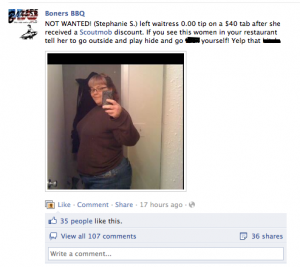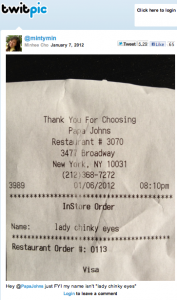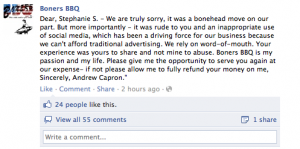 Last night I’m finally settling down after a very long day and I receive a Facebook message from Patrick Reyes (whom I’m not speaking to until after the Super Bowl) and a text message from Justin Brackett.
Last night I’m finally settling down after a very long day and I receive a Facebook message from Patrick Reyes (whom I’m not speaking to until after the Super Bowl) and a text message from Justin Brackett.
They both have sent me a photo that made my blood boil.
You see, Boners BBQ posted a photo of a customer, who apparently didn’t leave a tip, and used expletives to say what people should do to her if she comes into their restaurant.
Have a look for yourself.
The photo has since been taken down and an apology has been issued, but not before 71 people (overnight, by-the-way) chimed in.
I’m kind of astounded that the first post would even make its way to their Facebook wall.
Something rather similar happened at Papa John’s this past weekend. Shelly Kramer tells the story on her blog and you can read it here, but the gist of it is that a woman went into a restaurant, ordered, and rather than ask for her name, the kid behind the register wrote “lady chinky eyes” on the receipt.
Yes, in 2012 some kid actually wrote that on the receipt. The receipt the customer ended up seeing and posting on her social networks (rightfully so).
Here’s the deal. Neither one of these things are public relations issues. They both are culture, HR, and operations issues. But they both became public relations crisis because their customers now have this thing called social media at their disposal.
It used to be that the Papa John’s customer would have gone home and shown the receipt to her friends and family and they would have boycotted the restaurant. If she had any communication savvy, she may even have gone to the local news. But it would have stayed there – local.
Now she has access to hundreds, if not thousands, of people who will listen to her story and help her spread it far and wide.
On the flip side of things, your employees also have access to social media. I’m not entirely sure why the Boners BBQ employee thought it was OK to post a photo of a customer and say those awful things about her.
I waited tables in college. I know what it’s like to not get a tip, especially when the customer was extremely high-maintenance, but I’m pretty sure it never would have occurred to me to post a photo of that person on the wall of the restaurant…mostly from fear of losing my job.
It’s 2012. You can’t ignore the fact that, even if you don’t use social media, your customers do.
Because of that, you need to do two things right now:
- Write a social media policy. You can find a huge database of them so you have examples of what to include. But don’t just write the policy. Actually go through it with your employees. Give them examples like Kenneth Cole, Papa John’s, and Boners BBQ. Talk to them about the importance of being professional, no matter how much you want to tell your side of the story. In the public’s eye, and through social media, the customer is always right.
- Be prepared 24/7. Even if you don’t use social media 24/7 and give people time off, say so on your profiles. It’s pretty easy to write, “If there is an issue, we respond between the hours of X and X on Monday through Friday” (Comcast does this well). Boners BBQ deleted the post, but not until 107 people commented on it and it was shared nearly 40 times. They also issued an “apology,” which feels like an “I’m sorry, but” response. But they thought their job was done there. They’re being skewered in the comments and no one is responding. Crisis work is a 24/7 job. You must be prepared to not sleep one night, if that’s what it takes to manage the crisis…especially if you’re the one who created it.
Something bad is going to happen, just like it does offline. It’s just a matter of time. It’s in how you respond that makes or breaks you.
Update: Boners BBQ issued a real apology on their Facebook wall (see below). It took them 16 hours to do it, but they did it.



